|
|
|
Sort Order |
|
|
|
Items / Page
|
|
|
|
|
|
|
| Srl | Item |
| 1 |
ID:
121228
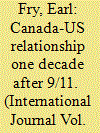

|
|
|
|
|
| Publication |
2012.
|
| Summary/Abstract |
The decade since the events of 11 September 2001 was difficult for the United
States. The nation endured its worst recession since the Great Depression
during the period from December 2007 to June 2009. Many Americans
suffered through a "lost decade," with fewer non-farm payroll jobs in
November 2011 than at the beginning of 2001.1
Median real household
income was also higher in 2001 than in 2011.
|
|
|
|
|
|
|
|
|
|
|
|
|
|
|
|
| 2 |
ID:
121230
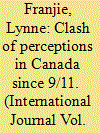

|
|
|
|
|
| Publication |
2012.
|
| Summary/Abstract |
Arab communities in the western world faced public scrutiny in the
aftermath of 11 September 2011. The Canadian Arab community, one of the
country's largest non-European ethnic populations, was no exception.1
This
scrutiny was mostly due to a failure to distinguish between the motivations
and beliefs of the 9/11 attackers and the culture of the Arab and Muslim
communities at large, which were still little-known, although they had been
present in the western world for several decades.
|
|
|
|
|
|
|
|
|
|
|
|
|
|
|
|
| 3 |
ID:
121229


|
|
|
|
|
| Publication |
2012.
|
| Summary/Abstract |
Since the morning of 11 September 2001, the temptation to interpret the
attacks as a hallmark of our individual and collective lives, to infuse the
events with transformational properties, has been ever present. An Ekos
poll published on 27 September 2001 showed that 77 percent of Canadians
believed that their "lives would be deeply and permanently changed by
these terrorist attacks."1
David Bercuson rightly noted that, "[as] with all
such sweeping generalizations, no one will really know until many years
have passed."2
Now, over a decade later, one can examine the effects of these
events on Canadian security and defence policy with the sobriety the passing
of a decade can bring. One common interpretation of Canada's response
to 9/11 is that Canada experienced the events by proxy, through the United
States.
|
|
|
|
|
|
|
|
|
|
|
|
|
|
|
|
| 4 |
ID:
121237


|
|
|
|
|
| Publication |
2012.
|
| Summary/Abstract |
During the first two decades of the Cold War, especially during the
administration of the United States presidents Dwight D. Eisenhower (1953-
1961) and Lyndon B. Johnson (1963-1969), relations between the US and
Indonesia were marked with suspicion, ambiguity, and antagonism. This
was in part due to the failures of many US policymakers in understanding-
let alone respecting-Indonesia's culture and politics, especially as they
manifested in the political views and personality of Indonesia's first
president, Sukarno. Failing to see Sukarno as a Javanese-Indonesian leader
whose views on domestic and international politics stemmed from his
Javanese background, many Cold War US policymakers considered him a
communist demagogue who threatened US interests and world peace.
|
|
|
|
|
|
|
|
|
|
|
|
|
|
|
|
| 5 |
ID:
121232
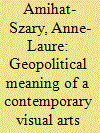

|
|
|
|
|
| Publication |
2012.
|
| Summary/Abstract |
WHY SEEK A VISUAL UNDERSTANDING OF BORDERS?
Their common border can be seen as a synecdoche of the complex relations
between Canada and the United States: not only is it the longest border in the
world (at 8,891 kilometres-5,061 kilometres on land and 3,830 kilometres
at sea), but it also represents a line where strong and soft politics and
geopolitics converge. One can say that the border not only divides the two
states but reflects their relations. Until recently, the border was considered
one of the most "benign" the world-an exceptional label, considering the border's length.1
For over two centuries, political divisions between the two
countries, inherited in part from a colonial divide in the east but also from the
outcome of frontier competition in the west, did not represent an obstacle to
everyday life in the border regions. In fact, various economic activities have
benefitted from houses built on the line in order to evade taxation, to the
more complex industrial systems, such as that of the automobile industry
in the Great Lakes region. These activities have led to the consolidation of a
number of cross-border regions, enhanced by NAFTA, which are witnesses
to both the vitality and variety of interactions along the line.2
|
|
|
|
|
|
|
|
|
|
|
|
|
|
|
|
| 6 |
ID:
121238
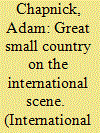

|
|
|
|
|
| Publication |
2012.
|
| Summary/Abstract |
In 1952, the Carnegie Endowment for International Peace thought it
worthwhile to commission a series of national studies on the United Nations
(UN). In Canada, the task was taken on by Fred Soward, an academic and
former special assistant in the Department of External Affairs, and Edgar
McInnis, president of the Canadian Institute of International Affairs and a
delegate to the 1952 UN General Assembly.1
Four years later, Canada and the
United Nations was released to uniformly positive reviews.2
|
|
|
|
|
|
|
|
|
|
|
|
|
|
|
|
| 7 |
ID:
121236
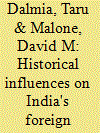

|
|
|
|
|
| Publication |
2012.
|
| Summary/Abstract |
India's international relations after independence in 1947 drew several of
its principal characteristics from earlier Indian history and, in particular,
from India's painful colonial experience under the British Raj.1
One that was
largely dormant until quite recently is India's vocation, throughout most of
its history, as a hub for international trade.
|
|
|
|
|
|
|
|
|
|
|
|
|
|
|
|
| 8 |
ID:
121235


|
|
|
|
|
| Publication |
2012.
|
| Summary/Abstract |
Is Canada's foreign policy aligned with that of the United States? This
question frequently comes up in foreign policy circles and was recently
raised during the popular uprisings in North Africa and the Middle East.
Some observers have maintained that Ottawa's policy with regard to the
"Arab Spring" followed that of Washington.1
This criticism is in keeping with
the perception that, since coming to power in February 2006, the Harper
government has strategically aligned Canada's policies more closely with
those of the United States.2
Some positions of the Harper government, in particular with respect to the Kyoto Protocol, the Israeli-Palestinian conflict,
and the North American security perimeter, have reinforced this idea.3
|
|
|
|
|
|
|
|
|
|
|
|
|
|
|
|
| 9 |
ID:
121233


|
|
|
|
|
| Publication |
2012.
|
| Summary/Abstract |
Canada and the United States form a highly integrated economic region;
indeed, since the signing of the North American Free Trade Agreement
(NAFTA) in 1993, economic integration of the two countries has progressed
faster than economic growth. In the 1990s scholars suggested that the
primary characteristic of the Canada-US border and surrounding regions
was an environment facilitating the seamless flow of goods and capital.
But since 9/11, borders have hardened, and some argue that securitization
has impeded trade and is now affecting all policy arenas concerned with
borderlands. This article is a review of those arguments.
|
|
|
|
|
|
|
|
|
|
|
|
|
|
|
|
| 10 |
ID:
121234
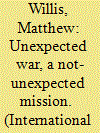

|
|
|
|
|
| Publication |
2012.
|
| Summary/Abstract |
As the fullest mobilization of Canadian men and materiel since the Korean
War, and also the costliest in blood and treasure, the 2005 deployment of the
Canadian Forces (CF) to Kandahar would deserve scholars' attention even
if it had gone according to plan. That it instead developed into something
neither the government nor the public had anticipated only enhances
the challenge-and value-of understanding it. Fuelled by the mission's
controversial nature, a sizeable literature soon developed to explain the
government's actions. The international system, institutional imperatives,
and even specific individuals have all been identified as key shapers of policy.
Diverse though it is in some respects, however, the literature is in others
strikingly homogeneous, particularly as concerns its geography: most of the
studies of Canada's third Afghan deployment have been carried out in North
America, and usually Canada.
|
|
|
|
|
|
|
|
|
|
|
|
|
|
|
|
|
|
|
|
|